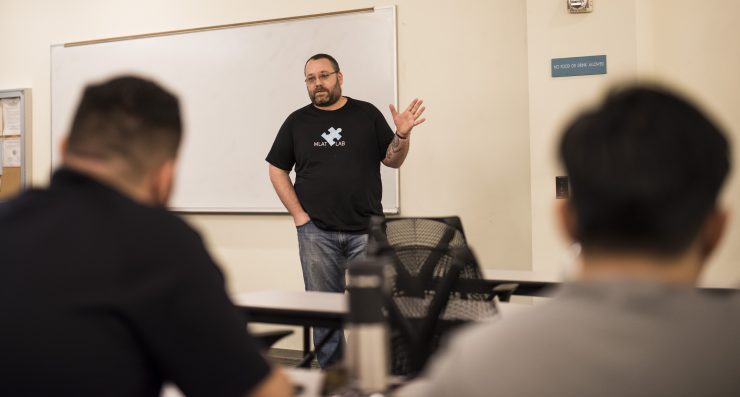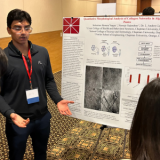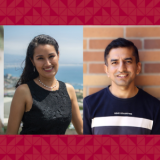
Machine Learning and Affiliated Technologies (MLAT) Lab Applies Advanced Technology to Autism Spectrum Disorder (ASD) Research Honoring Autism Acceptance/Awareness Month through innovation in student and faculty research
April 29, 2023
As Autism Acceptance/Awareness Month comes to a close, this time offers an opportunity to highlight the work that Chapman students and faculty have dedicated to Autism Spectrum Disorder (ASD) research. When it comes to members of the Machine Learning and Affiliated Technologies (MLAT) Lab, this means honoring how their promising research into developmental disabilities can further assist autistic people in navigating their daily lives.
Led by Dr. Erik Linstead, Associate Professor and Senior Associate Dean at Fowler School of Engineering (FSE), the MLAT Lab combines behavioral data with machine learning. In applying their findings to existing AI language models or developing new ones, they hope to achieve a simple yet profound aim: to enrich the lived experiences of people with developmental disorders through cutting-edge technology. They specialize in applications that support the autistic community, particularly to assist with screening, therapy, and resource development.
“My recent research involves making the ASD diagnosis process faster using machine learning,” explained Gabriela Pinto (Computational and Data Sciences ‘23), a Graduate Research Assistant who has worked at the MLAT Lab since 2020. “Right now, it takes a whole team of people—clinicians, experts who can observe and take notes—to provide a full diagnosis. Unfortunately, this requires a lot of time, money, and resources. For a lot of families, effective support means breaking down the barriers that make it difficult for people to get that initial diagnosis.”
For both Linstead and Pinto, this research interest is not only in response to socially-impactful problems with accessible care—it also stems from a personal investment drawn from their own families’ experiences.
“When I first started at MLAT as a Computer Science student, I didn’t have the specific goal of pursuing autism research,” said Pinto. “However, when the idea was presented I thought it would be interesting not only because it’s an area of research that doesn’t really have a lot of intersection with computer science or data science, but because I also have a personal connection to it: I have very close family members who are diagnosed with ASD. For those interested in this type of research, although there are obstacles that come with any research project, it’s important to focus on the potential effect—that’s really what inspires us.” In the future, Pinto aims to expand her positive impact by incorporating state-of-the-art AI language models such as ChatGPT into her doctoral work.
Dr. Linstead’s interest in autism research developed when his daughter was diagnosed with ASD at three years old. This experience led Linstead to wonder: how could he take his background in computer science, machine learning, and AI gained at The Boeing Company and use it to aid the autistic community at large? In 2015, he founded the MLAT Lab to explore this core question, hoping to create a space where students and faculty could use machine learning to make a difference in the lives of other autistic children. Much of his current research centers around developing systems capable of analyzing the effectiveness and specifications of therapy on a personal level, ensuring that individual children receive the resources they need to independently navigate the world through their own interests and choices.
“When you’re talking about kids like my daughter, they still want to have a typical childhood and do all the things that kids do,” Linstead shared. “When my daughter was new to therapy, she was there for 40 hours a week. In a sense you’re really grateful to have resources available for your child, but at the same time, it’s all-consuming. If you can show with data that 20 hours a week of therapy is getting the same results as 25 hours, then that’s an extra five hours a week that my daughter could spend reading a book, hanging out with friends, watching TV, or playing with the dog. For me, that’s what drives this research: how can we meaningfully support children while also providing them with as much time as possible to do things that interest them?”
Though the team includes members across a variety of disciplines, degree programs, involvements, and schools within Chapman, all are united by a shared passion for understanding how their practical applications of technology can answer questions that everyone from families to insurance companies would benefit from. Linstead cited this enthusiasm as the fuel that makes MLAT research so powerful among Chapman’s research communities.
“The most important thing to me is that the students are excited to be working on their projects and can do it in a way that aligns with everything else they’re doing, whether they’re taking 18 units or are busy with extracurriculars,” stated Linstead. “Their dedication and desire to improve the human condition are really inspirational. I think the students who decide to take advantage of this part of Chapman are really happy they did.”
To Linstead, the lab’s successes and research endeavors encapsulate what Chapman University does and can do to continue supporting neurodiverse populations in California and beyond.
“With Autism Acceptance/Awareness Month in mind, we talk a lot about diversity, equity, and inclusion here at Chapman and do so for good reason,” said Linstead. He points out that current estimates in California suggest that 1 in 26 kids will be diagnosed with ASD. “Neurodiversity sometimes doesn’t get as much attention as it should … Not only can we do amazing research here at Chapman, but as a university we can also create a safe and accepting environment for neurodiverse students where they can come, be welcomed, fit in, and have their needs met. Hopefully as a community here at Chapman, we are doing something good for neurodiversity.”
Those interested in supporting, joining, or learning more about autism research conducted through the MLAT Lab are encouraged to visit their website here.

